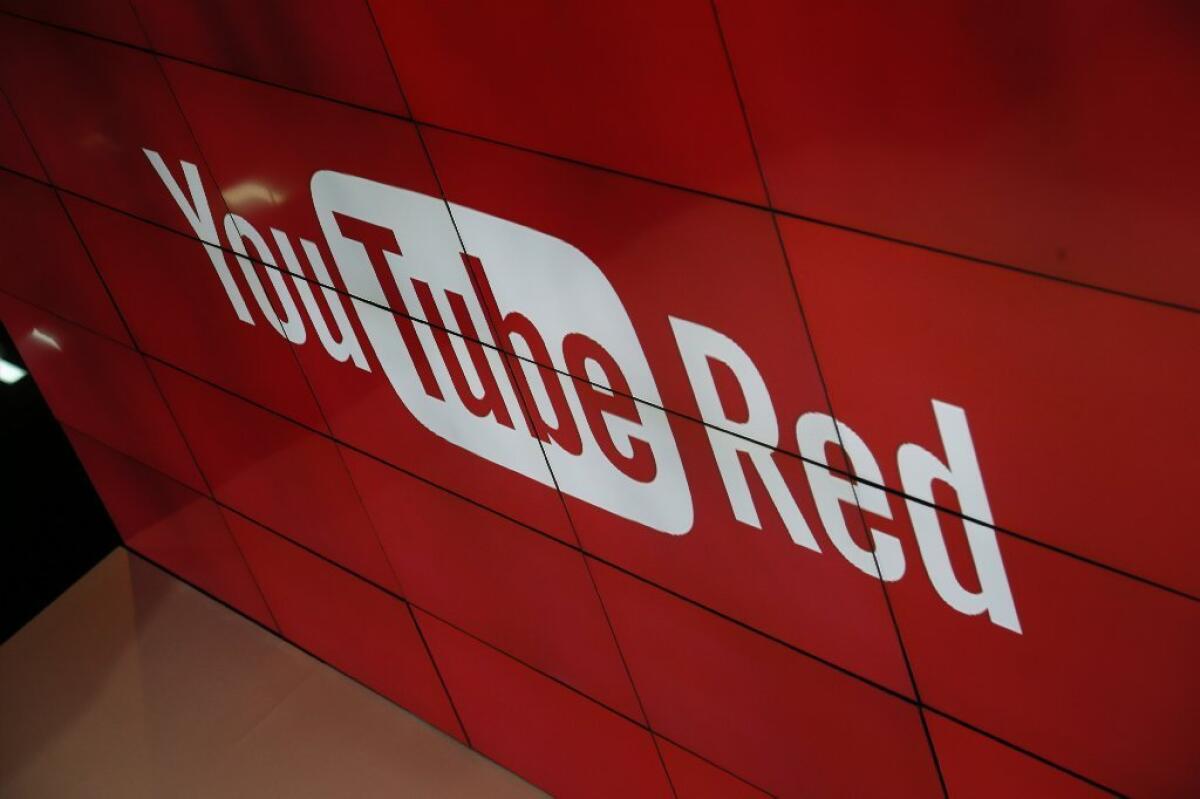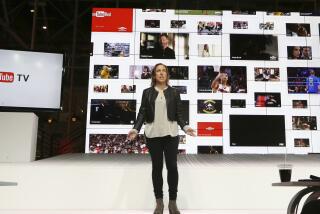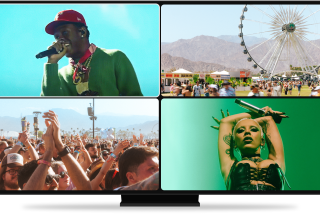YouTube seeks streaming rights to TV shows and movies to bolster Red subscription service

YouTube Red was launched in October and gives subscribers access to the site’s content free of advertising.
If you’re past your 20s, chances are you’ve never heard of PewDiePie, Lily Singh and the Fine Bros.
But with their massive followings online, the homegrown YouTube stars have outshined many in Hollywood, boasting the advertising and sponsorship deals to prove it despite living mostly on the Google-owned video portal.
------------
FOR THE RECORD:
YouTube: In the Dec. 4 Business section, an article about YouTube’s efforts to bolster its new subscription service Red identified Jason Ahmad as chief executive of the Venice company Epoxy. He is chief product officer of the firm. —
------------
Now there appear to be limitations to their stardom.
YouTube has been in talks with television networks and Hollywood studios to purchase streaming rights to TV shows, movies and other content that can help bolster its new subscription service, YouTube Red.
The news, first reported by the Wall Street Journal, suggests that the YouTube stars, beloved by tween audiences, may not be enough to propel Red as it aims to challenge streaming stalwarts like Netflix, Hulu and Amazon.
SIGN UP for the free California Inc. business newsletter >>
The development comes just five weeks after the launch of the subscription service, which charges $9.99 a month for ad-free access to YouTube, streaming music and exclusive content created by the site’s stable of Internet stars.
Although YouTube hasn’t disclosed how many subscribers the service has picked up, experts say the quick change in strategy indicates that something could be amiss with the new product.
“Well, that didn’t take long,” said Jim Nail, principal analyst for Forrester Research. “When YouTube first announced Red, it was going to be a place to get exclusives and the best of YouTube stars. But clearly that’s insufficient to justify the $9.99 price.”
YouTube declined to comment, saying it would not address “rumor or speculation.”
However, several major TV studios told The Times on Thursday that there have been preliminary conversations with YouTube about acquiring streaming rights.
It remains unclear what kind of content YouTube is after. But if it does secure streaming rights to hit television shows and movies, it would be an about-face from its original strategy for Red.
YouTube Chief Business Officer Robert Kyncl, who previously led Netflix’s transition from a movie rental site to streaming TV shows, told news website the Verge this year that he had no plans to spend heavily to license expensive content like “the NFL or ‘Seinfeld.’”
“To us, what is important is we are not doing what everyone else is doing, competing for the same sources of material, the same creative elements,” Kyncl said. “We are looking for people who are proven to work really well on our platform.”
But not doing what everyone else is doing could hurt YouTube, especially as rivals including Netflix, Amazon and HBO have garnered widespread attention and devoted fans for their original shows such as
“Orange Is the New Black,” “House of Cards” and “Game of Thrones.” Those are aimed at older audiences compared with YouTube’s bread-and-butter content.
PewDiePie, a Swedish YouTube star known for his video gaming vlogs (video blog, to the uninitiated), naturally appeals to younger audiences who consume entertainment online, mostly on hand-held devices.
That demographic difference could be an impediment, said Alan Wolk, senior analyst at media consulting firm the Diffusion Group.
“Most of Red’s audience needs to get their parents to pay for the subscription,” Wolk said. “A lot of them will ask their kids why they can’t just watch the ads.”
Moreover, Netflix and other streaming services still rely on a vast catalog of movies and TV shows to keep subscribers paying month after month after the hit shows lure them in.
Analysts say YouTube could be looking to do the same in its current talks with Hollywood. The difference this time is that much of the best shows and movies have been snatched up already.
“What’s left for them to buy?” Wolk said. “It’s like showing up for Cyber Monday at 11:59 p.m. All the good stuff is taken.”
It isn’t cheap either. Netflix will spend $3.3 billion and Hulu $1.5 billion on content licensing and acquisition this year, according to RBC Capital Markets.
Netflix is also planning to spend $1 billion on marketing alone next year. And for good reason. Digital TV and video revenue will reach $26 billion this year, up from just $4.2 billion in 2010, according to research firm Digital TV Research.
The industry is expected to reach $51.1 billion in revenue by 2020.
YouTube has its advantages, namely a vast global audience. But it also boasts some of the best streaming technology, an easier mobile interface compared with its rivals and a huge parent company.
“YouTube has the financial backing of Google,” said Jason Ahmad, chief product officer of Epoxy, a Venice firm that helps promote YouTube content creators. “They absolutely can make a credible case to win this market. Whether they’re willing to do it is another question.”
------------
FOR THE RECORD
An earlier version of this story incorrectly described Ahmad’s title. He is chief product officer.
------------
YouTube isn’t devoid of Hollywood content. Recent movies can be rented for $4.99 or bought for less than $20. The site famously streamed Sony Pictures’ North Korean-focused comedy “The Interview” last year after theaters refused to show the film because of security threats.
Although Red was built on the idea of making premium content on the backs of YouTube’s homegrown stars, it was already forging partnerships between Hollywood titles and its own talent. Among the original content planned for Red was a teaming up of PewDiePie and the creators of “The Walking Dead” and a Fine Bros. project called “Sing It!,” which satirizes TV shows like “American Idol” and “The Voice.”
Follow @dhpierson for tech news.
Times staff writer Yvonne Villarreal contributed to this report.
ALSO
What’s next for leadership at long-struggling Yahoo?
Zuckerbergs to give 99% of their Facebook shares to charity
Thanks to Google, now you can watch 360-degree videos of ballets, operas and symphonies







